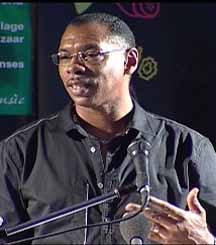Co-Chair of the CARICOM Regional Task Force on Cultural Industries, Adrian Augier, last Thursday told a meeting of culture ministers in Georgetown that the Caribbean had failed to maximize its advantage in the creative cultural industries.
He called for Intellectual Property (IP) Legislation that would support major regional artists. Augier pointed out, the region had forfeited significant potential revenue which could be derived from their top-earning artists and entrepreneurs, according to a press release from the CARICOM Secretariat at Turkeyen.
Augier was quoted as saying also that the urgent response to this was the creation of an “enabling, enlightened, informed policy environment that was consistently accessible to practitioners and investors at national and regional levels.” This environment, he said, was an imperative for the cultural industries in CARICOM to thrive and flourish.

The Saint Lucian-born poet and economist was delivering the feature address at the opening ceremony of the 22nd Meeting of the Council for Human and Social Development (COHSOD 22) in Georgetown where he and his co-Chair, Jamaica’s culture icon Sydney Bartley presented on behalf of their 20-member task force, the draft Regional Development Strategy and Action Plan for the Cultural Industries in CARICOM.
This comprehensive strategy has charted clear directions for the Caribbean Community in harnessing the potential of its Caribbean cultural industries.
Pointing to what he described as the top ten priorities in the strategy, Augier presented evidence to illustrate that cultural and creative industries are currently among the most dynamic sectors in world trade.
In 2008, the world financial crisis precipitated a fall in global demand and a contraction of 12 percent in international trade. Despite this, however, world exports of creative goods and services continued to grow, reaching $593 billion in 2008; more than double their 2002 level, realizing an annualized growth rate of 14% over six consecutive years, according to the Creative Economy Report (2010) by UNCTAD and UNESCO.
These statistics bear serious consideration: Artists such as the late Bob Marley, Elvis Presley, Michael Jackson and Selena have increased in popularity and continue to generate taxable income streams for individuals and businesses involved in the management and commercial exploitation of their multi-million dollar legacies, Augier noted.
Earnings from the creative industries sector demonstrate significant resilience to natural disasters, economic downturns, and in the case of Buju Banton, even incarceration. Indeed, a small initial investment in intellectual property, be it digital image, lyrics, choreography or product design, can produce an enduring revenue stream without further continuous investment.
With this in mind, Augier expressed concern that “in the absence of an enabling environment, many Caribbean artists either reside abroad, or have the major supporting elements of the value chain of their businesses, based outside our region.”
Augier stated that with the value chain residing out of the region, artistes such as Rihanna, who is a billion dollar business, with 10-15,000 persons earning from her talent, had all her “back-end support” including artist management, administration, accounting, legal, marketing and promotion, image and catalogue management, provided by persons and companies based outside the region.
“Put plainly, the Government of Barbados earns relatively little in taxes and other revenue from their number one global export,” Augier asserted.
He noted that Rihanna was not registered with the Barbados Copyright Society of Composers Authors and Publishers (COSCOP), and that neither Sean Paul, nor Beenie Man nor Shaggy was registered with the Jamaican equivalent – Jamaican Association of Composers Authors and Publishers (JACAP). They were members of the US-based American Society of Composers, Authors and Publishers (ASCAP) or the British equivalent, BMI.
According to Augier, the region could only benefit from the “lucrative value chain that is available” only if it developed the relevant infrastructure, particularly the Intellectual Property (IP) Legislation, to support major regional artists such as Machel, Junior Gong and Anya Achong-Chee who recently won the highly visible Project Runway Competition, and who should not have to reside in New York to be commercially and financially viable.
He added that the region needed to invest in its artists by creating the necessary institutions, incentives and educational environment to develop the right expertise. “We must not miss this proverbial boat,” he concluded.
COHSOD 22, which focused on Youth, Culture and Sports, endorsed the draft Regional Development Strategy and Action Plan for the Cultural Industries in CARICOM and approved in principle, the strategic directions presented, conceding that there was a need to explore various mechanisms to establish a public/private sector fund for cultural industries.
They further requested the Council for Trade and Economic Development (COTED) and the Council for Finance and Planning (COFAP) to examine proposals to set up this financing mechanism, the release concluded.





